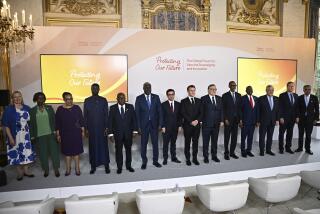Rich Nations Must Help Fight AIDS, Clinton Says
- Share via
COVENTRY, England — President Clinton said Thursday that the United States, Britain and other wealthy nations must give financial help to the pharmaceutical industry to develop and distribute vaccines and other drugs to combat infectious diseases such as AIDS that are devastating many of the world’s poorest countries.
There is a “huge need” for an AIDS vaccine, and the greatest demand “is among people who have no money to pay for it,” the president said in a wide-ranging speech at Warwick University here, as he called for a crusade to close the financial and health gaps between the rich and poor of the world.
While the U.S. and Britain are appropriating some money to develop vaccines against acquired immune deficiency syndrome, much more is needed, Clinton said, noting that “the difference between what the world provides and what the world needs for treatment and prevention of AIDS, malaria and tuberculosis is $6 billion a year.” America’s appropriate share of that cost would be $1.5 billion, the amount spent by the federal government each year for office supplies, “or about what the people of Britain spend every year on blue jeans,” he said.
In what was most likely his last major address on foreign policy while in office, the president spoke expansively of a global agenda for the 21st century that embraces trade, improved health, education and widespread use of computers as methods to help poor countries achieve prosperity.
Clinton was making a bid to enlist the support of governments in wealthier nations as well as that of the public to narrow the gap between affluence and extreme poverty.
“With the Cold War over, no overriding struggle diverts us from aiding the survival of the hundreds of millions of people in the developing world struggling just to get by from day to day,” he said. “Moreover, it is not only the right thing to do, it is plainly in our interest to do so.”
Infectious diseases are responsible for one in four deaths worldwide, the president said.
“Already in South Africa, Botswana and Zimbabwe, half of all 15-year-olds are expected to die of AIDS,” he told the audience at Warwick, one of Britain’s leading research universities. “In just a few years, there will be three to six African countries where there will be more people in their 60s than in their 30s. This is a staggering human cost.”
The U.S. has boosted its spending for disease research and is spending more money buying vaccines “so that companies know there will be a guaranteed market” for treatments for AIDS and other diseases, Clinton noted.
There also is a tax credit to help in development of future vaccines.
But it’s not enough, Clinton said, because private companies that develop pharmaceuticals do not see how they can recoup their huge investments if their best customers are impoverished nations.
“We can’t ask them to go broke: We’re going to have to pay them to do it--directly, or indirectly through tax credits.”
Clinton’s focus on AIDS during his speech Thursday highlighted one of the problems he and British Prime Minister Tony Blair have discussed as being obstacles to successful globalization. Clinton and Blair share the vision that the benefits of free trade and new technology cannot be spread to all people unless they first have basic health care, an education and access to computers.
Clinton later returned to the U.S. from his farewell visit to Ireland and Britain aboard Air Force One, still optimistic about the prospects for securing peace in British-ruled Northern Ireland.
During his three-day trip, Clinton met privately with leaders in Dublin, the Irish capital, as well as Belfast, the provincial capital of Northern Ireland, to prod them to work together to solve their differences and realize the benefits of the 1998 Good Friday peace accord, which provides for political power-sharing between Roman Catholics and Protestants in the north.
But Northern Ireland’s hopes for lasting peace remain snagged on issues of disarmament, policing and demilitarization.
The president, who was accompanied by his wife, Hillary Rodham Clinton, and daughter Chelsea on the trip, also visited Queen Elizabeth II at Buckingham Palace before returning to Washington late Thursday.
More to Read
Sign up for Essential California
The most important California stories and recommendations in your inbox every morning.
You may occasionally receive promotional content from the Los Angeles Times.













